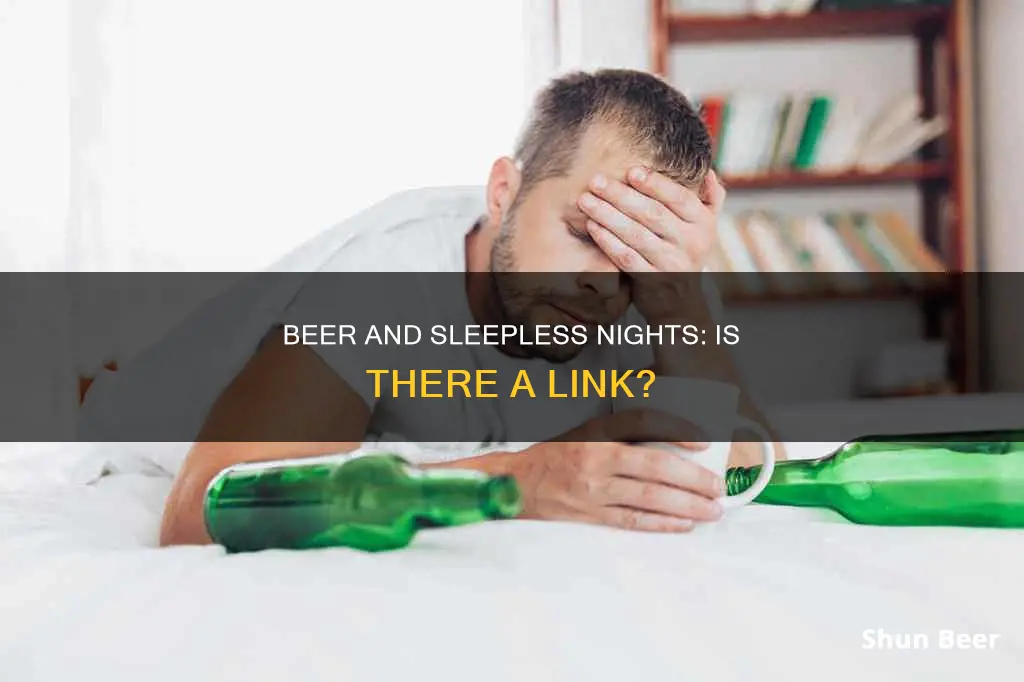
Alcohol is known to negatively impact sleep quality and duration, and research has confirmed a link between alcohol consumption and insomnia. Insomnia is a sleep disorder characterised by difficulty falling or staying asleep, or waking up early and being unable to fall back to sleep. It can have detrimental effects on one's mood, energy levels, physical and mental health, work performance, and quality of life.
Alcohol disrupts sleep cycles and inhibits REM sleep, which is essential for long-term memory storage and dreaming. While it can initially act as a sedative, helping one fall asleep faster, alcohol increases the likelihood of waking up in the middle of the night and feeling groggy the next morning.
Additionally, heavy drinking and alcohol dependence are associated with insomnia and other sleep disorders. Alcohol can worsen sleep disorders such as sleep apnea, a condition where breathing stops and starts during sleep, increasing the risk of heart attack, stroke, and sudden death.
Therefore, it is important to avoid alcohol close to bedtime and not use it as a sleep aid, as it can disrupt sleep and lead to or exacerbate insomnia and other sleep disorders.
| Characteristics | Values |
|---|---|
| Effect on sleep quality | Alcohol can negatively impact sleep quality, causing frequent waking and low-quality sleep. |
| Effect on sleep quantity | Alcohol can decrease the amount of sleep one gets. |
| Effect on sleep cycles | Alcohol disrupts sleep cycles, particularly the REM stage, which is essential for long-term memory storage and dreaming. |
| Effect on sleep disorders | Alcohol can cause or exacerbate sleep disorders such as insomnia and sleep apnea. |
| Risk factors | Alcohol use increases the risk of developing insomnia, especially in older adults and those with alcohol dependence. |
| Treatment | It is recommended to avoid alcohol close to bedtime and to practice good sleep hygiene, such as maintaining a regular sleep schedule and limiting screen time before bed. |
What You'll Learn

Alcohol disrupts sleep cycles
Alcohol can negatively impact sleep in several ways, including by disrupting the sleep cycle. When we sleep, our minds journey through a series of four stages that repeat in cycles. Alcohol consumption can affect all four stages of the sleep cycle.
Stage 1 (N1)
The first stage of sleep is a non-REM sleep phase that occurs within the first 1 to 7 minutes of falling asleep. During this stage, the heart rate and breathing begin to slow down, and the body starts to relax. Alcohol can disrupt this stage by increasing the time spent in N1 sleep, leading to frequent wakings and fragmented sleep.
Stage 2 (N2)
The second stage of sleep is also a non-REM sleep phase, lasting for roughly 25 minutes. It is characterised by a burst of electrical activity in the brain, and the body idles between light and deep sleep. Alcohol can disrupt this stage by altering the sleep architecture and causing more frequent wakings.
Stage 3 (N3)
The third stage of sleep is a deeper level of non-REM sleep, where brain waves slow down and physical activity, such as eye movement and muscle activity, decreases. This stage is crucial for tissue repair and other vital body functions. Alcohol can disrupt this stage by increasing the quantity of non-REM sleep during the first half of the night, leading to a decrease in REM sleep later on.
Stage 4 (REM)
The fourth and final stage of sleep is the REM stage, which stands for rapid eye movement. This stage typically lasts between 10 minutes and one hour and is essential for long-term memory storage and dreaming. Alcohol inhibits REM sleep, particularly during the second half of the night. This disruption can lead to a lack of sleep or insomnia.
Acute and Chronic Effects
The effects of alcohol on sleep can be both acute and chronic. Even a single serving of alcohol can disrupt sleep, and the impact increases with higher doses and long-term consumption. Additionally, heavy alcohol use can contribute to the development of insomnia, with up to three-quarters of people with alcohol dependence experiencing insomnia symptoms.
Beer's Blood-Thinning Effect: Myth or Reality?
You may want to see also

Alcohol negatively impacts sleep quality
Secondly, alcohol interferes with sleep by contributing to or exacerbating sleep disorders such as snoring and sleep apnea. For individuals who snore or have sleep apnea, alcohol consumption can worsen symptoms. In the case of sleep apnea, a serious sleep disorder characterised by pauses in breathing during sleep, alcohol increases the likelihood and duration of breathing interruptions. This combination of alcohol use and sleep apnea can further elevate the risk of heart attacks, strokes, and sudden death.
Additionally, alcohol use and dependence have been linked to disruptions in circadian rhythms, the biological patterns that govern our sleep-wake cycles. Alcohol may decrease the body's sensitivity to cues such as daylight and darkness, which are crucial for regulating shifts in body temperature and the secretion of the sleep hormone melatonin. As a result, individuals may experience alertness when they want to sleep and sleepiness when they need to be awake.
The negative impact of alcohol on sleep quality is evident in both acute and chronic effects. Even a single serving of alcohol can make it more difficult to achieve deep, restful sleep. With continued use, individuals can rapidly develop a tolerance to the sedative effects of alcohol, leading to higher consumption and an increased risk of developing alcohol use disorders. Therefore, while alcohol may initially seem like a helpful sleep aid, it ultimately disrupts sleep quality and can contribute to or exacerbate sleep disorders.
Drinking Beer While Driving: What's the Law in New Zealand?
You may want to see also

Alcohol increases risk of sleep disorders
Alcohol can have a detrimental impact on sleep quality, and research has found a link between alcohol consumption and insomnia. While alcohol can initially act as a sedative, over time, it causes significant disruptions to sleep.
Sleep Cycles
Alcohol affects the sleep cycle by altering the stages of sleep. Typically, a sleep cycle consists of three non-rapid eye movement (NREM) stages and one rapid eye movement (REM) stage. During the night, the body cycles through these stages every 90 to 120 minutes, with NREM sleep dominating the first part of the night and REM sleep increasing in the latter half. Each stage is crucial for the body to feel refreshed and for essential processes such as learning and memory consolidation to occur.
When alcohol is consumed before bed, it increases the duration of N3 sleep ("deep sleep") and reduces REM sleep. Later in the night, once the body has metabolised the alcohol, there is a rise in N1 sleep (the lightest stage of sleep), leading to frequent awakenings and fragmented sleep. This disruption to the sleep cycle results in low-quality sleep.
Sleep Disorders
Alcohol not only disrupts sleep cycles but also contributes to various sleep disorders, including insomnia and sleep apnea.
Insomnia
Insomnia is a common sleep disorder characterised by difficulty falling or staying asleep. Research indicates that between 35% and 70% of individuals who consume alcohol experience insomnia. Alcohol dependence is strongly associated with insomnia, with an estimated prevalence of 36% to 91% among those struggling with alcohol dependence.
Sleep Apnea
Sleep apnea is a serious sleep disorder where breathing repeatedly stops and starts during sleep. Alcohol consumption, particularly in higher doses, can exacerbate sleep apnea. Heavy drinkers are at an increased risk of developing or worsening sleep apnea, which can elevate the risk of heart attack, stroke, and sudden death.
Circadian Rhythm Disruptions
Alcohol use and dependence can interfere with circadian rhythms, the biological patterns that govern our sleep-wake cycles. Alcohol may decrease the body's sensitivity to cues such as daylight and darkness, which are crucial for regulating body temperature and the secretion of the sleep hormone melatonin. As a result, individuals may experience alertness when they want to sleep and sleepiness when they want to be awake.
Beer and Type 2 Diabetes: What's Safe?
You may want to see also

Alcohol withdrawal affects sleep
Alcohol withdrawal can cause insomnia, which is a common symptom of both acute alcohol withdrawal (1 to 2 weeks) and early recovery (2 to 8 weeks). Insomnia symptoms during alcohol withdrawal can vary, sometimes improving quickly, but they can also persist for several weeks or months. Research suggests that between 36% and 91% of people experiencing alcohol withdrawal have insomnia.
During alcohol withdrawal, it is harder to fall asleep, and sleep is often fragmented with a lower percentage and duration of REM sleep. These sleep problems can continue for months or even years into the sustained recovery phase of alcohol use disorder.
There are several ways to treat alcohol withdrawal insomnia:
- Set a precise bedtime: Going to bed and waking up at similar times each day helps your body adjust to a particular circadian rhythm.
- Avoid mid-day caffeine: While caffeine can be helpful in the morning, consuming it in the afternoon or evening can interfere with winding down at bedtime.
- Avoid daytime naps: Although it may be tempting, especially after a poor night's sleep, avoiding naps during the day will make it easier to fall asleep at night.
- Create comforting bedtime rituals: Incorporate soothing activities into your bedtime routine, such as drinking tea or reading a book, and avoid screens for an hour before bed.
Drinking Beer with CPAP: What You Need to Know
You may want to see also

Alcohol impacts sleep architecture
The typical sleep cycle begins with three non-rapid eye movement (NREM) stages of sleep and ends with rapid eye movement (REM). During sleep, the body cycles through all of these stages every 90 to 120 minutes, with NREM sleep dominating the first part of the night and REM increasing during the second part of the night. Each stage is necessary for sleep to feel refreshing and for vital processes like learning and memory consolidation to occur.
When you go to bed with alcohol in your system, you’re likely to experience more N3 sleep (deep sleep) and less REM sleep than usual, at least initially. Later in the night, once your body has metabolized the alcohol, you’re likely to experience a rise in N1 sleep (the lightest stage of sleep). This can lead to frequent wakings and fragmented, low-quality sleep.
Alcohol also suppresses REM sleep, which is when most dreaming occurs. Later in the night, as alcohol levels drop, your brain kicks into overdrive. You may toss and turn as your body undergoes a rebound arousal and you're more likely to have vivid or stressful dreams.
Moderate doses of alcohol facilitate "rebound" REM sleep and stage 1 sleep. Following the suppression of REM and stage 1 sleep in the first half of an eight-hour sleep episode, REM and stage 1 sleep increase well beyond baseline in the second half.
CBD Oil and Beer: Is It Safe to Mix?
You may want to see also
Frequently asked questions
Yes, research has confirmed a link between alcohol consumption and insomnia. Alcohol disrupts sleep cycles and inhibits REM sleep.
Drinking beer can affect the quality and length of your sleep, leading to sleep disorders such as insomnia and sleep apnea. Beer can increase the quantity of non-REM sleep during the first half of the night, but it decreases REM sleep in the second half.
The effects of alcohol usually increase with the amount consumed. However, even small amounts of alcohol can have noticeable effects on some people. It is recommended to avoid alcohol at least 3 hours before bed.
Insomnia can increase the risk of various health problems, including diabetes, heart disease, depression, and obesity. It can also lead to accidents, reduced productivity, and a decreased quality of life.







